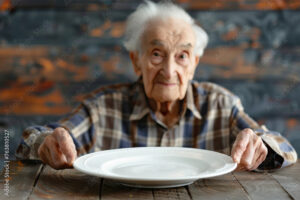Malnutrition in Nursing Homes
Skilled Nursing Home Abuse Attorney
Bedsores · Wrongful Death · Medication Errors · Nursing Home Falls
Serving all of New Jersey & Pennsylvania including Philadelphia & Bucks Counties
Elder Abuse & Nursing Home Neglect
Malnutrition in Nursing Homes & Assisted-Living Facilities
All New Jersey and Pennsylvania (including Philadelphia) nursing homes are mandated under state and federal law to provide sufficient food so that their residents received adequate nutrition.
Unfortunately, these laws are sometimes broken and all too often nursing home residents in Philadelphia / Pennsylvania and New Jersey suffer malnutrition. When this happens, the wrongdoing nursing home can be held responsible for causing the malnutrition.
 Malnutrition in Nursing Homes Is Neglect
Malnutrition in Nursing Homes Is Neglect
Malnutrition is nearly always avoidable. If it is avoidable and still occurs, then the development of the malnutrition is a form of nursing home neglect. Malnutrition happens when an individual is deprived of a substantial amount of nutrition. If left unaddressed, malnutrition can become a very serious threat to a nursing home resident’s health, causing significant and drastic weight loss, deprivation of vital nutrients and, in certain extreme cases, can lead to death.
If you have reason to believe your loved one has suffered malnutrition at their Philadelphia / PA or NJ nursing home, contact nursing home abuse attorney, Brian P. Murphy. Mr. Murphy has handled a litany of nursing home malnutrition cases. He is very well-versed in the topic of nursing home malnutrition and has the experience and resources to provide you top-notch legal representation.
Call Mr. Murphy and he will provide you a one-on-one free consultation. He will listen to your concerns and help you determine if your loved one has been the victim of nursing home abuse or neglect.
Common Signs of Malnutrition in Nursing Homes
Below is a list of some typical signs of malnutrition in nursing homes. In the event your loved one has suffered from any of these symptoms, he or she may have been subjected to malnutrition. Contact nursing home abuse attorney Brian P. Murphy today to discuss.
- Significant and sudden weight loss
- Reduced meal consumption
- Poorly wound healing
- Untouched food left in the room
- Food left out of reach of a resident
- Yellow shading of the skin
- Mouth sores
- Irritability
- Confusion
- Dental problems
- Reduced muscle mass
- Diarrhea
Why Malnutrition Happens at Nursing Homes
Nursing home care providers have the duty to make sure their resident’s do not become malnourished. Since nursing homes are caring for elderly / vulnerable nursing home residents, they need to be very attentive to their needs. Unfortunately, many Philadelphia / Pennsylvania and New Jersey nursing homes are operated with too few nurses and nurse aides which results in a significant decline in proper care to nursing home residents. Making matters worse, many Philadelphia / PA and NJ nursing homes also fail to properly train and educate their nursing staff about how to avoid allowing residents to become malnourished.
Below are some actions nursing homes should be taking with their residents to avoid the development of malnutrition. If these actions are not taken, the nursing home can be considered negligent:
- Regularly providing residents with food and making certain it is properly consumed;
- Make certain residents are provided essential vitamins, minerals, and proteins;
- Provide proper supervision of food intake during meal and snack times;
- Take the time to properly feed those residents that cannot feed themselves;
- Educate nursing home staff on nutrition and proper feeding methods;
- Monitor residents’ ability to chew and swallow;
- Monitor residents’ dietary restrictions and abide by prescribed doctors orders;
- Monitor residents’ medications for their potential impact on malnutrition;
- Monitor residents’ mood to determine if it is impacting his or her appetite; and
- Conduct regular recordings of residents’ food consumption.
How Insufficient Nursing Staff Relates to Malnutrition
Malnutrition occurs when an individual’s proper nutritional levels are not adequately maintained. Although there are a number of possible contributing factors to malnutrition, often a nursing home abuse attorney will find that it has occurred simply because the staff did not feed a resident. This failure to feed the resident is not typically the result of a failure by the facility to provide a sufficient number of staff to care for their residents.
Nursing home abuse attorneys regularly find that many nursing homes have too few care providers for the number of elderly residents the home agrees to take in. This often leaves the care providers without enough time during their shifts to complete their tasks. As a consequence, basic needs, such as proper feeding of elderly nursing home residents will often go unmet.
Nursing home abuse attorneys, such as Brian P. Murphy find this particularly true with residents who are unable to feed themselves. Such residents are at a significantly higher risk of malnutrition because it takes time to feed residents who cannot care for themselves – time the nursing home care providers simply cannot always afford. Nursing home abuse attorneys commonly hear stories of food trays just being left at the bedside of such residents and food going untouched for hours at a time.
You Need a Nursing Home Abuse and Neglect Attorney
If you think your loved one is suffering from malnutrition, you should learn your rights. Pennsylvania and New Jersey laws only permit a limited amount of time to file a nursing home abuse lawsuit. You need to take immediate action. Contact Philadelphia / Pennsylvania and New Jersey nursing home abuse attorney Brian P. Murphy. He will provide you with a free comprehensive consultation and guide on how you will need to move forward.
By phone – Attorney Brian Murphy is available to discuss your Philadelphia / Pennsylvania or New Jersey nursing home malnutrition case by telephone. Just call (215) 579-8500 to connect with Mr. Murphy. He makes himself available seven (7) days a week to answer nursing home abuse and neglect questions for incidents arising in Pennsylvania (Philadelphia, Bucks, Montgomery, and more) and New Jersey nursing homes. Contact Mr. Murphy right away to preserve your loved one’s rights.
By text – All text messages from The Nursing Home Attorneys go directly to Mr. Murphy. Engage him in a text exchange now. He can offer you quick advice or call you for a more detailed discussion.
In person – Attorney Brian Murphy will meet you at his office or can often be available to come to a local location to discuss your nursing home abuse/neglect case in detail and explain your rights to you. Contact Malpractice Attorney Brian Murphy today to schedule your free consultation.
A Seasoned Malpractice Attorney

Nursing home abuse and neglect is a complex area of the law. You need an experienced nursing home attorney to answer your questions and offer you guidance in moving forward. Attorney Murphy has been filing lawsuits against New Jersey and Pennsylvania nursing homes (including Philadelphia) for more than 10 years. Mr. Murphy knows which questions will get directly to the issues you are concerned about. He is fully familiar with all the signs and symptoms of nursing home abuse and neglect. He can help you identify and put a stop to your loved one’s abuse or neglect. See what Mr. Murphy’s prior clients have to say about him.
In Pennsylvania, Mr. Murphy files nursing home lawsuits from Philadelphia to Pittsburgh. He also files suits throughout New Jersey. Mr. Murphy has been very successful in litigating claims against PA and NJ nursing homes and earned millions of dollars in compensation for his clients.
If you see signs of nursing home abuse or neglect, schedule one of the firm’s free consultations today. Contact Nursing Home Abuse Attorney, Brian P. Murphy, to discuss your potential legal matter.
Legal matters are billed on a contingency fee basis. All Philadelphia / Pennsylvania and New Jersey nursing home abuse cases are personally handled by Brian Murphy.
This website is owned by The Law Firm of Brian P. Murphy, PC. Its purpose is to assist you in understanding your rights, especially when it comes to preventing or protecting yourself and/or your loved ones against nursing home abuse, neglect, bedsores, dehydration, and wrongful death.
Nothing on this website is to be construed as attorney advice or otherwise creating an attorney-client relationship. If you may be interested in establishing a relationship with The Law Firm of Brian P. Murphy, PC, please contact us to discuss your options.

